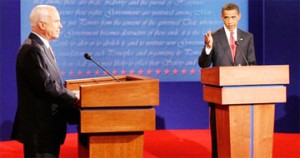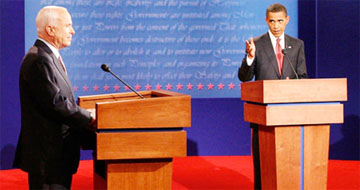Obama pulling away
Wayne Brown is a well-known Trinidadian writer and columnist who now resides in Jamaica. This is the twenty-seventh in his Sunday Stabroek series on the US presidential election.
One minute into his first response to moderator Jim Lehrer’s first question in the first presidential debate, John McCain invoked Winston Churchill. (The reference was apparently wasted — no American commentator, so far as this columnist has read, heard behind McCain’s “This isn’t the beginning of the end of this crisis; this is the end of the beginning,” Winston Churchill’s cautiously expressed optimism, once the US had entered the Second World War: “This isn’t even the beginning of the end. But it is, perhaps, the end of the beginning.”)
Next McCain invoked Dwight Eisenhower — something to do with accountability and honour.
This was two Fridays ago, already deep into the current Wall Street crisis, and Lehrer’s questions had been (1) “Where do you stand on the financial recovery plan?” and (when McCain replied with three or four clichéd generalizations) (2) “Senator McCain, are you in favour of this plan?” That was the context, a financial conundrum and threat, in which McCain invoked two famous Anglo-Saxon warlords from 67 years ago.

The Wall Street crisis has been unkind to Senator McCain. Granted, Hurricane Ike had smiled on him, giving him the excuse to shorten the Republican National Convention by a day and keep the detested George W Bush and Dick Cheney from appearing at it in person, bringing with them the kiss of death to McCain’s presidential hopes.
But Wall Street has more than cancelled out the silver lining to that cloud. McCain is, inconsolably, a warrior; that in fact is all he is; and, as the references above unwittingly reveal, he sees himself in relation to some putative heroic past, a descendant of the calcified pantheon of Second World War leaders, men like Churchill and Eisenhower (and no doubt Marshall and MacArthur).
But the gap between Churchill and Warren Buffett, or between Eisenhower and Treasury Secretary Paulson, is so huge as to make gibberish of McCain’s really rather childish fantasies about himself, and by the day of the debate his campaign was already foundering in the quicksand of his manifold lurching responses to the financial crisis. Kinder gods would have given him a Russian invasion of Ukraine, or an Israeli attack on Iran, or even an unusually outlandish threat by Venezuela’s Chavez against some Latin American ally of the Bush administration — something that would have allowed McCain to unburden himself of some heraldic nonsense (“We shall fight them in the Dardanelles! We are all of us Israelis!”).
As it was, however, McCain went into that first debate with the polls already swinging towards Obama, whose measured thoughtfulness, once decried as passionless, was suddenly being seen as a far superior response to the danger the US (and the world) had suddenly found itself in, by comparison with McCain’s ineffectual, bull-in-a-china-shop prescriptions. And his, McCain’s, fury at having his ‘Palin bounce’ so emphatically erased by matters which didn’t interest him, and about which he knew nothing, really, was so palpable that during the debate he dared not look at Obama, lest he rush over and choke him.
Presidential debates are often remembered less for their details than for a single impression or moment — Bush 41 looking at his watch, Al Gore ‘sighing’ — and the all-important narrative to emerge from the first Obama-McCain debate was that McCain was ‘angry.’ It wasn’t a mood that, after eight years of Bush-Cheney, Americans were inclined to ignore or tolerate.
Indeed, the real news to come out of that first debate was the disconnect it revealed between the media pundits and the American electorate. The former judged the debate a draw, more or less; some were even inclined to rhapsodize over McCain’s performance. But the polls — not just the often unreliable insta-polls, conducted on debate night, but the follow-up, Saturday-to-Monday polls — all showed Obama winning handsomely. Where the pundits saw McCain as ‘forceful,’ the American electorate saw him as angry and rude. Where the pundits decried as weakness the number of times Obama professed to agree with McCain, the electorate saw such agreement as the refreshing honesty of a moderate, non-partisan uniter. Obama, they agreed, had easily cleared the foreign policy and, more importantly, the ‘presidential’ bar. Many of them, it turned out, were seeing and hearing him for the first time. Overwhelmingly, they were surprised, impressed and relieved.
Obama’s road to the White House was now open. Now the tide of polls in his favour began to turn into a flood.
(Vice-presidential debates are notoriously unimportant to the outcome of presidential elections, but the same general response greeted the much-ballyhooed Biden-Palin debate on Thursday night. While Republicans were dancing on tables and kicking up their heels over Palin’s triumph over mere incoherence, the New York Times editorialized sternly that she’d ducked many questions on the economy, and on foreign policy had sounded frighteningly simplistic and superficial. And once more the morning-after polls gave the outcome to Biden, by as much as two-to-one. Biden, incidentally, had been superb: widely knowledgeable, quietly passionate and to the point.)
It’s clear that the scary implications of the Wall Street crisis have concentrated Americans’ minds (no time for talk about lipstick on pigs any more!), and that McCain’s spectacular blunderings as he’s sought an heroic role for himself in a matter he doesn’t understand have disenchanted them deeply. On Friday, for the first time, the Real Clear Politics average of the national polls gave Obama a six-point lead — a margin that’ll translate into an utter rout of McCain if it holds on election day. And at the State and Electoral College Votes (EV) level, the picture could hardly be less ambiguous.
Counting likely and ‘leaning’ states, Obama currently leads McCain by a whopping 260 to 163 EVs. (270 are needed to win.) Only three of the toss-up states are blue states, and Obama leads in all of them: in New Hampshire by 10 points, in Pennsylvania by 12, and in Minnesota by 11.
By contrast, there’re nine red or ‘George Bush’ states that have now been posted in the toss-up column — and Obama is currently leading McCain in all but one.
Obama leads in New Mexico by 6; in North Carolina by 3; in Florida — Florida! — by 4; in Ohio — Ohio! — by 4; in Nevada by 2; in Iowa by 14; in Virginia by 9; and in Missouri by 1. (No Republican has ever won the White House without winning Missouri.)
As this is being written, news comes that the McCain camp is closing down its campaign in Michigan, where as recently as two weeks ago it had fancied its chances. As for the lone red toss-up state where McCain still leads, that state’s Indiana.
The McCain campaign has long ignored Indiana, this on the realistic assessment that if they lose Indiana it means they’ve lost the election. McCain’s lead in Indiana is currently down to a single point. Granted, there’re still two debates to go, and the Bradley effect (racist voters lying to the pollsters and thus falsifying the polls) needs to be taken into account. But what these polls — not just the numbers, but their unanimity, and their trending — are heralding is an Obama landslide, come November.

